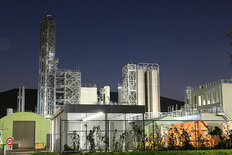- The plant will process 26,000 tons per year, starting end of 2024.
- Recycling focuses on polystyrene and polyolefins, producing styrene, ethylene, and propylene.
- Partners include Trinseo, INEOS Styrolution, and TotalEnergies.
- Capacity aims to increase to 65,000 tons by 2028.

Introduction
In Antwerp, a new recycling plant has been established to process polystyrene (PS) and polyolefins (PO) into high-quality raw materials suitable for food packaging. This initiative supports the EU's recycling targets and aims to reduce the extraction of new raw materials.
Recycling Process
The plant will recycle PS from items like yogurt cups and meat trays into pure styrene, which will be re-polymerized into PS. For PO, the process involves producing naphtha, which is then converted into ethylene and propylene, the building blocks for polyethylene and polypropylene. The facility will operate using green energy, including solar and wind power.
Operational Timeline
Construction of the plant is complete, and testing of installation components is underway. Full operations are expected to begin by the end of 2024, with an initial processing capacity of 26,000 tons per year. Plans are in place to increase capacity to 65,000 tons by 2028.
Partnerships and Collaborations
The project involves collaborations with several companies, including Trinseo, INEOS Styrolution, and TotalEnergies, for the purchase of recyclate. The plant also benefits from synergies at the Indaver site in Antwerp, ensuring a stable energy supply and efficient handling of recycling residues.
Future Plans
Looking ahead, there are discussions to establish additional advanced recycling plants at strategic locations across Europe, further expanding the capacity and impact of this recycling initiative.

